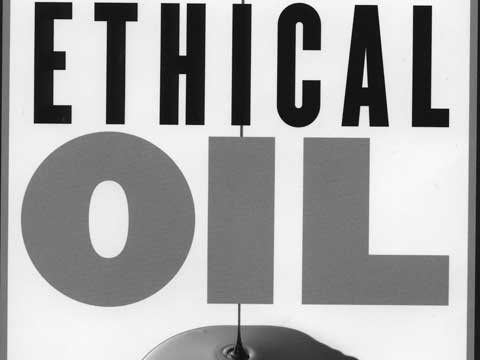Is there a more divisive figure in Canadian public life than Ezra Levant?
The man is a literal sounding board for this country's political camps. Conservatives look at him as a hero, a civil rights leader fighting for free speech in a society hostile to right-leaning views.
Liberals see him as a pest, a yapping philistine of a Tory terrier who wants to privatize health care, end reconciliation efforts with First Nations and join the United States as its 51 st ward.
In recent years I've supported Levant in his fight against human rights commissions, semi-judicial tribunals that have made it their mandate to prosecute opinions they find offensive.
So it was with some disappointment that I read Ethical Oil, a polemic that tries to make the case that we're locked into consumption of oil from Canada's oil sands.
In the book, a whirlwind read at only 261 pages, Levant tries to step out of his comfort zone and make his argument as a liberal. He chooses four criteria to qualify his liberalism: economic justice; peace and conflict; treatment of minorities; and, yes, environment.
On all of these counts, he argues, Alberta's oil sands make the grade better than any other options available.
On the issue of minorities, for example, the oil sands pass the gender test with flying colours. In Fort McMurray, the Mecca of Canada's oil development, the mayor is female, while in Saudi Arabia proper a woman could ill hope to walk alone in public, let alone work in oil or serve in politics.
Environmentally, he says, the impact is not as severe as critics make it out to be. Thousands of ducks have indeed died in Syncrude's tailing ponds, but so too have birds been sliced up by wind turbines; flown into the towering walls of urban skyscrapers; and deep fried into double down sandwiches at KFC.
Alberta is our only choice, it seems, and without it we are doomed to consume oil from human rights abusers like Sudan, Iran and Saudi Arabia.
This would be a persuasive argument if it were uniformly true, but it's not. It simply defies the evidence to suggest that we have only reprehensible dictatorships to turn to if we wish to keep consuming oil.
Take, for example, a report I received once from the industry-funded Canadian Energy Research Institute. I was doing a story on a documentary about the oil sands and asked for some factual information to counter some of the claims a filmmaker was making.
The report showed that just over half of Canadian oil consumption in 2008 came from Canada itself. Our second biggest source of oil was the North Sea - fully 15 per cent of our consumption from an area administered by liberal countries such as the U.K., Norway, Germany, Denmark and the Netherlands.
Next on the list to Canada was Norway at eight per cent; the United Kingdom at seven per cent; Angola at five per cent; and "other countries" at four per cent. Only there do we find Saudi Arabia, sitting pretty at four per cent - less than five other countries that sell us oil in amounts that exceed Saudi's by orders of magnitude.
Now Canadian consumption isn't a focus of Levant's book. His primary interest is foreign consumption of Canadian oil and its place in the global market. It's not entirely fair to slam him for neglecting the North Sea, but it is fair to assume that if Canada depends so heavily on that source, that other countries surely draw from the same trough.
Where the book works is when it spanks Canadian activists for taking on an easy target in the oil sands. As Levant describes it, they ignore real human rights abusers in Sudan, Iran and China, opting instead to characterize their country as "Saudi Canada" and relentlessly pummel away at a single province.
Perhaps his best chapter is reserved for Andrew Nikiforuk, a Canadian journalist who has helped popularize the derisive moniker, "tar sands." Nikiforuk, he writes, rather incredulously calls himself an objective journalist whilst taking money from Greenpeace.
All in all, Ethical Oil is an enjoyable read. It's quick and easy to understand, and it rightly informs activists of where their priorities should lie. But when it comes to the economics of oil, it just isn't very credible.




